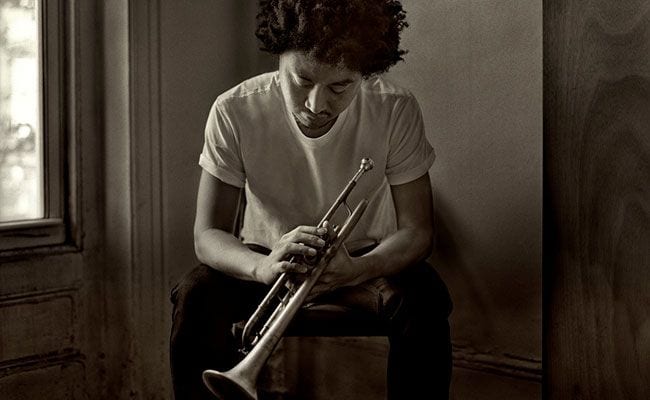
Tayuka Kuroda is a talented young trumpet player from Kobe, Japan, by way of (of course) the Berklee College of Music and the New School of Music in Manhattan. At the New School, Kuroda hooked up with singer Jose James, and he has been playing in James’s band recently, part of the soulman’s superb 2013 effort, No Beginning and No End on Blue Note. Kuroda isn’t new to recording, but Rising Son is his Blue Note debut, produced by James.
So, what we have here is a soul-jazz date that sounds alternately thrilling and generic. Rising Son is fresh as can be at the moments when it seems to be hitching the classic sounds of The Jazz Crusaders (punchy horn lines, a trombone-strong front line, concise solos with a blues pungency) to 21st century grooves that mix Afrobeat variety with the hip-hop edge of someone like Robert Glasper. But Kuroda never risks much here – setting up short solos and somewhat samey-same melodic patterns – and so it’s not clear that Rising Son gives the soul-jazz genre much of a facelift.
Here’s what I love: the original tune “Afro Blues”, the quintet (Corey King on trombone, Kris Bowers on Rhodes, Solomon Dorsey on electric bass, and the drum chair nimbly filled by Nat Smith) supplemented by Lionel Louke on guitar, a polyrhythmic groove that mixes plucked guitar, hand percussion, drums, and interlocking bass lines on electric piano and deep bass guitar. This guy percolates under a super-staccato melody line – bup-bup-bup-bup – until the bridge blooms into a smoother line supplemented by delicious chords. Ooooh, it feels good, and then the soloists get out there to play over the groove.
Here’s what I don’t love: that so much of this record feels like a slightly less wonderful version of “Afro Blues”. As the disc moves from cut to cut, well, you get the punching basic melody of “Piri Piri” blossoming out into a more harmonically complex bridge again. And then you realize that opener, “Rising Son” has pretty much the same bones except you’d overlooked it because the synth bass and wah-wah trumpet seemed like a slightly cheesy misstep right out of the gate.
The other mode that Rising Son presents is a sexy, slow groove jam, embodied best by the two Roy Ayers covers here. The first, the well-known “Everybody Loves the Sunshine”, is sung by Jose James over a really relaxed and spare groove and four-chord descending pattern that you could listen to all night. The second, “Green and Gold”, is about at the same tempo with a nicely phrased melody for the brass. But as those songs melt into the two album-closers (“Sometime, Somewhere, Somehow” and “Call”) it seems a bit like Rising Son has settled into a slow jam space that it can’t, well…, rise out of.
Referring to The Crusaders up front was meant as praise. That group of Texas jazz players who loved gospel sounds and soul pockets had a long life playing heartfelt jazz that could legitimize the idea of jazz that loved Ray Charles as much as it loved Sonny Rollins. “Call” recalls Crusader tunes like the mellow “Whispering Pines” (from Southern Comfort). But Kuroda’s version doesn’t have the same downhome grease – it feels more antiseptic, less feeling, less like storytelling.
Why? Is it that the players sound too much alike, too much like they (indeed) went to Berklee? I like Kuroda’s playing in plenty of places. It’s clean and harmonically clever and utterly ready for prime-time. But, at least on Rising Son the playing sounds less like the crackling joy of Lee Morgan than it sounds like the fluid flugelhornery of 1970s and 1980s icon Chuck Mangione.
Does that sound too harsh? It’s not. Mangione could play, and in his day he was doing just what Kuroda is doing here: combining modern jazz with the pop sounds of the day to find an audience. “Feels So Good” may seem like a leisure suit today, wildly out of style and pretty thin on timelessness.
Here’s hoping that Rising Son fares better. It sounds good, but it hits the same groove too often. It’s still looking for its sense of adventure.


![Call for Papers: All Things Reconsidered [MUSIC] May-August 2024](https://www.popmatters.com/wp-content/uploads/2024/04/all-things-reconsidered-call-music-may-2024-720x380.jpg)



